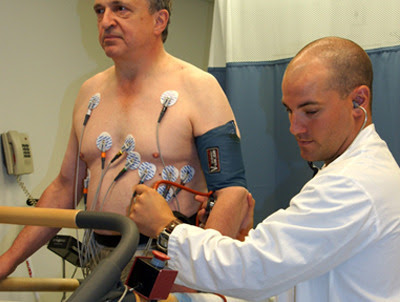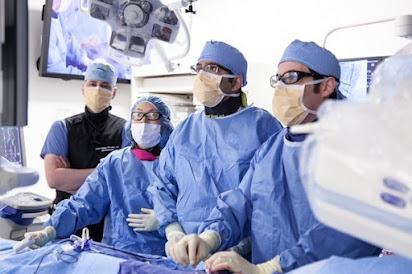Heart pacemaker surgery is a procedure to implant a device
that helps control abnormal heart rhythms. This type of surgery is also called
cardiac resynchronization therapy (CRT) or biventricular pacing. The heart has
four chambers: the two atria (upper chambers) and the two ventricles (lower
chambers). The atria receive blood from the body and pump it into the
ventricles. The ventricles then pump blood to the lungs and the rest of the
body.
In people with heart pacemaker surgery, the atria and
ventricles don't always work together. This is called heart block. Heart block
can cause the heart to beat too slowly. A pacemaker is a small device that's
placed under the skin in the chest.
It uses electrical pulses to help control the heart rate.
Heart pacemaker surgery is done to treat heart block and other conditions that
cause the heart to beat abnormally. The surgery is usually done when other
treatments, such as medication, have failed.
What Happens During
Heart Pacemaker Surgery?
Heart
Pacemaker Surgery in Kalyan is usually done as an outpatient procedure,
which means you can go home the same day. The surgery takes about 1 to 2 hours.
You'll be given general anesthesia to keep you comfortable during the surgery.
During the surgery, your doctor will make a small cut in your skin and insert
the pacemaker under the skin.
Your doctor will then attach the pacemaker to the right
ventricle with one or two wires, called leads. The other end of the lead is threaded
through a vein to the heart muscle. The lead carries electrical impulses from
the pacemaker to the heart muscle. This helps the ventricles to contract
together, which makes the heart beat more efficiently.
After the surgery, you'll be taken to a recovery room where
you'll be monitored for any complications. You may have some bruising and
soreness where the pacemaker was inserted. These side effects are usually mild
and go away in a few days.
What Are the Risks of
Heart Pacemaker Surgery?
As with any surgery, there are risks associated with heart
pacemaker surgery. These risks include infection, bleeding, and damage to the
blood vessels or heart. In rare cases, the pacemaker may not work properly or
may need to be removed. Before the surgery, your doctor will discuss the risks
with you and answer any questions you have.
What Is the Recovery
Time for Heart Pacemaker Surgery?
After the surgery, you'll be taken to a recovery room where you'll be monitored for any complications. You may have some bruising and soreness where the pacemaker was inserted. These side effects are usually mild and go away in a few days.
You'll be able to go home the same day or the day after the Heart
Pacemaker Surgery in Kalyan. You should avoid strenuous activity for 4
to 6 weeks. This will give your chest time to heal.
Your doctor will let you know when it's safe to resume your
normal activities. You'll need to have regular checkups with your doctor to
make sure the pacemaker is working properly. The battery in the pacemaker will
need to be replaced every 5 to 7 years. You may need more surgery to replace
the battery or the entire pacemaker.










